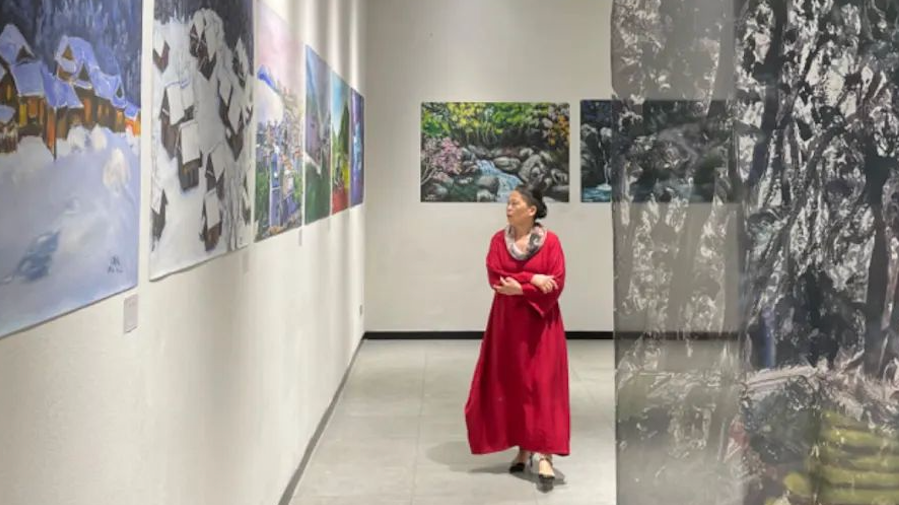
Wang Liuyun at one of her exhibitions. /Courtesy of Wang Liuyun
Wang Liuyun at one of her exhibitions. /Courtesy of Wang Liuyun
Lime-gray river rocks suffuses most of this oil on canvas, dotted with celadon undershrub on the bank and lush mosses clinging on a few stones. In the dark shading, a bright yellow moss flower blooms.
Stones constitute a recurring theme in the oeuvre of Wang Liuyun, one of the emerging female figures in China's art circle. To the 57-year-old self-taught painter who works as a cleaner in Beijing's central business district, paintings themed or replenished by stones represent an arcadia from her childhood memory.
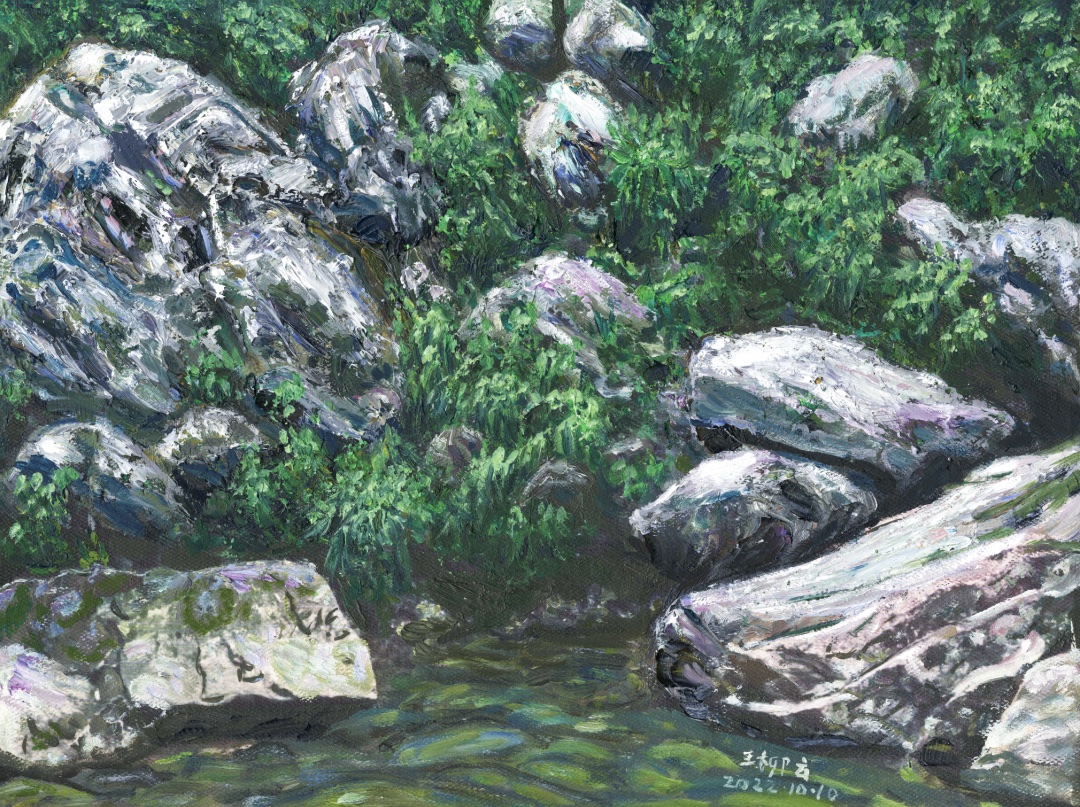
A painting featuring stones by Wang Liuyun. /Courtesy of Wang Liuyun
A painting featuring stones by Wang Liuyun. /Courtesy of Wang Liuyun
Wang's ancestral home was in a village in the mountains of central China's Hunan Province, called Quqi, situated along a river and scattered with rocks. Quqi, in two Chinese characters, means ditches in the river and forks in the road, which she had loathed as a child but found full of lacerating wit later in life when she herself experienced ups and downs. But the isolated village was gone before she was born. "My father was 17 years old back then, lost his family and home, and trudged northward to a barren land, called Yanjiakou. There he built the first house, and the place thrived," Wang said.
Behind the house was a small, neglected stone hill, where she often spent a whole day as a child. She was never tired of hopping through the gritty lanes. "I was so infatuated with those stones and the plants clinging onto them," she recounted. She speaks very fast, in Hunan-accented Mandarin. "I loved that 'secret garden,' where you could find everything beautiful, eccentric and desolate about the stone. It cultivated my solitude and shaped my character."
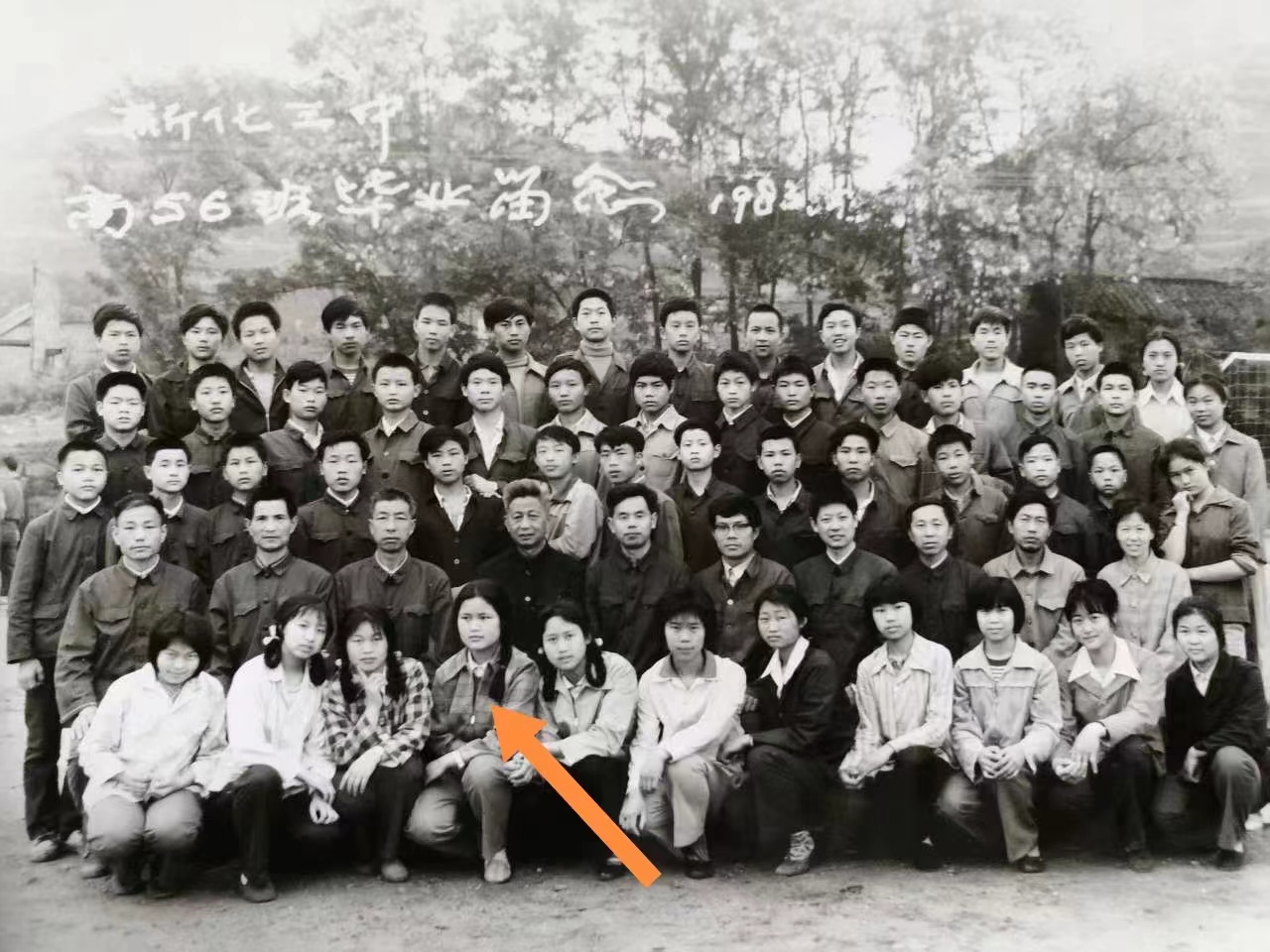
Wang Liuyun during her middle school years. /Courtesy of Wang Liuyun
Wang Liuyun during her middle school years. /Courtesy of Wang Liuyun
Wang referred to the first half of her life as "miserable." She was derided by her peers because her father was crippled by polio. Her family forced her to drop out of high school. "I loved reading and writing but I had no power, or to say, dignity, to like a book," she said. At age seven, she often went to her elder brother-in-law's attic, which housed over 100 books, to read in a faint light. "But his mother was very condescending: 'Who do you think you are? Girls don't read.'" She could not afford proper books until she was around 40 years old, when she bought a bunch of Chinese philosophy classics.
Her life took a turn in the late 1970s as China's reform and opening-up policies began.
Upon learning about a national policy encouraging rural households to grow fruit plants to become better off, she began studying relevant expertise and techniques, though no one in her village bought the policy and ridiculed her as being quixotic. "But I was always the weird one. In their eyes, I was that 'preposterous woman'," she said, shrugging her shoulders. Soon she made her first fortune – 5,000 yuan ($700), megabucks back then – from selling the seedlings. She then passed her experience onto a dozen neighbors and helped them build up a financial cushion. "I knew how hard a life people in my village were living. Some families had their kids spend winter nights on straw inside wooden cabinets to avoid dying from freezing. So I had, kind of, a savior complex."
However, her fortune invited more misfortune. A man came to her for her money. "At first he was very good to me. We got married and soon had a daughter. Then he showed his true colors." Her first husband beat her, snatched all her savings, and threatened to take their daughter's life if she were to file for divorce. She didn't want to delve into the details of this marriage, which she described as "living in hell" and ended with the man dying in a car accident.
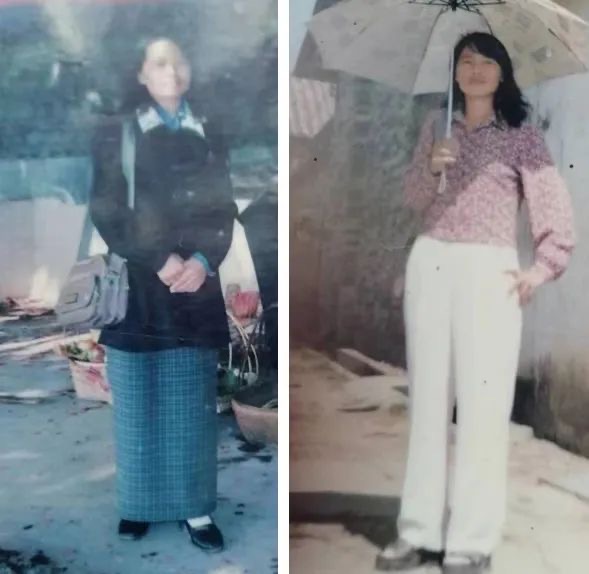
Wang Liuyun in her 20s. /Courtesy of Wang Liuyun
Wang Liuyun in her 20s. /Courtesy of Wang Liuyun
"It was not until then that I realized I should probably resign myself to fate," she sighed, shading her eyes. She moved to Taizhou, a coastal city in east China's Zhejiang Province, amid the massive migration of rural workers to big, more affluent cities. There she met her second husband, a guileless yet slothful local for whom she didn't have much affection when they got married. But he had a homestead in the suburbs, sufficient to gratify Wang's wish to have a home after the death of her loving father when she was young and a marriage of lies and violence.
Wang worked hard, as a textile factory worker, a janitor, a waitress, all to pay all household expenditures, build a four-story house in the suburbs, buy a car and send her daughter to college. By the time she made a decent living in a well-furnished house, she was 50. "But I felt like I was living in a prison."
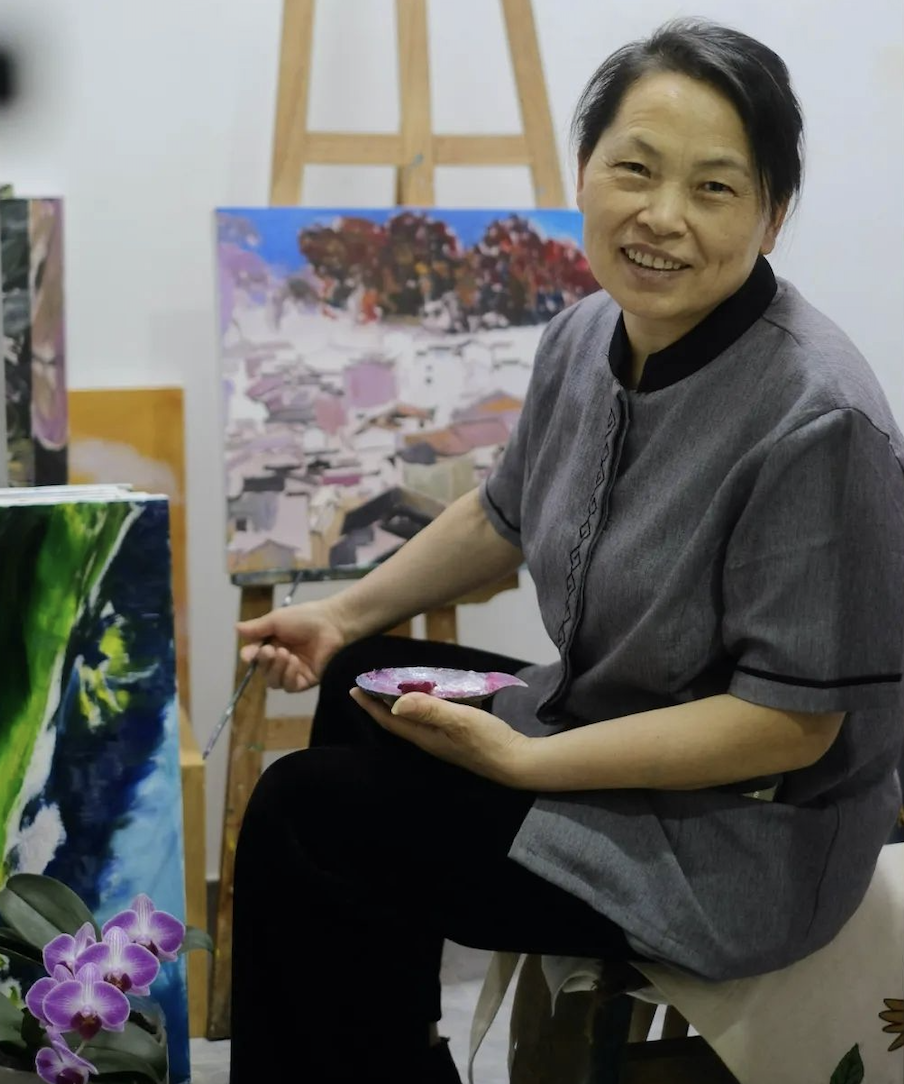
Wang Liuyun working on a painting while at work in an office building in Beijing. /Courtesy of Wang Liuyun
Wang Liuyun working on a painting while at work in an office building in Beijing. /Courtesy of Wang Liuyun
'I've always been a rebel'
At the end of 2016, Wang turned on the TV and saw a report that a 60-year-old woman produced an oil painting of a barn lantern after spending a week learning painting at an art studio for free in east China's Fujian Province. She was tempted. "As flinty as a stone, I've always been a rebel."
Wang left on a southbound train for Fujian, at the age of 51. In a department store-converted studio, she painted a barn lantern, a wooden bench and a shabby hat in three days. Soon she sold one painting for 150 yuan. Then she turned outward to nature. With a brush in hand, she kept thinking of her hometown and infused the canvases with richly patterned montages of the mountains, the trees, the stones and the tiny flowers blossoming out of them in her memory.
During that one year in Fujian, she brushed off, little by little, her poignancy, suppression and distress piled up over the past decades. She shaved off half of her hair and tied the other half into a ponytail, which she interpreted as "starting anew."
Within a short time, she sold quite a few paintings and earned acknowledgment from the art tutors and her peers at the studio, which gave her a sense of fulfilment and long-lost joy.
However, she decided to leave for somewhere else after biking across all the ancient villages, rivulets, stage stations and gravel alleys in town. "Staying in one place will drain your soul," she said. For her, any depletion in creativity is deadly.

Wang Liuyun's works. /Courtesy of Wang Liuyun
Wang Liuyun's works. /Courtesy of Wang Liuyun
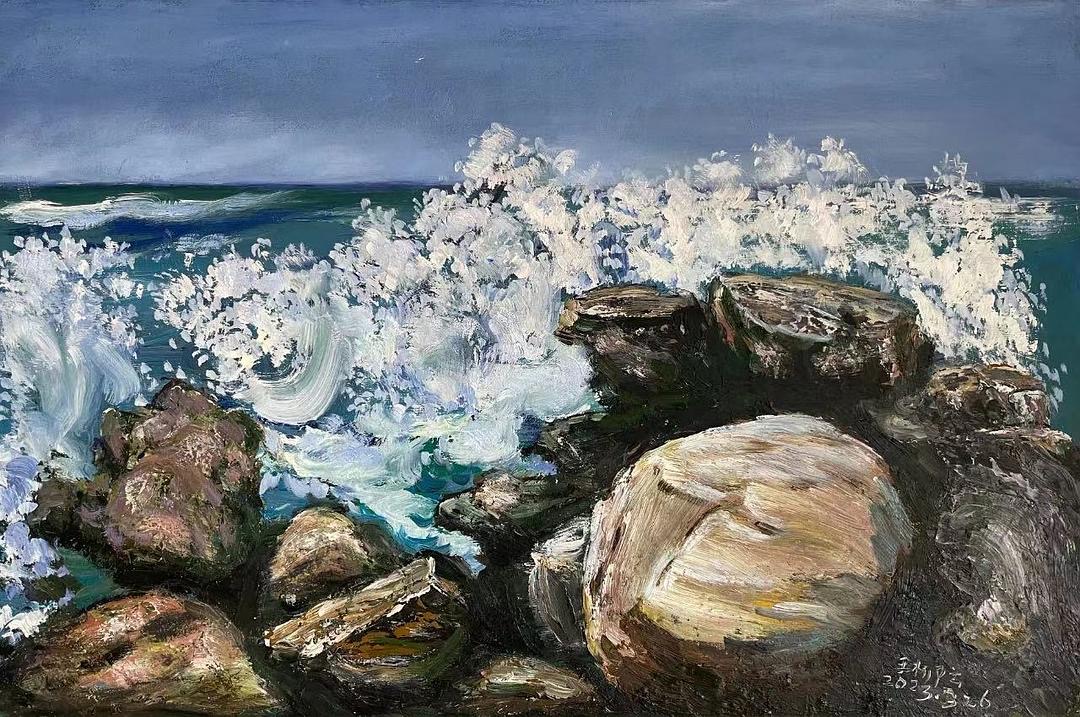
Wang Liuyun's works. /Courtesy of Wang Liuyun
Wang Liuyun's works. /Courtesy of Wang Liuyun
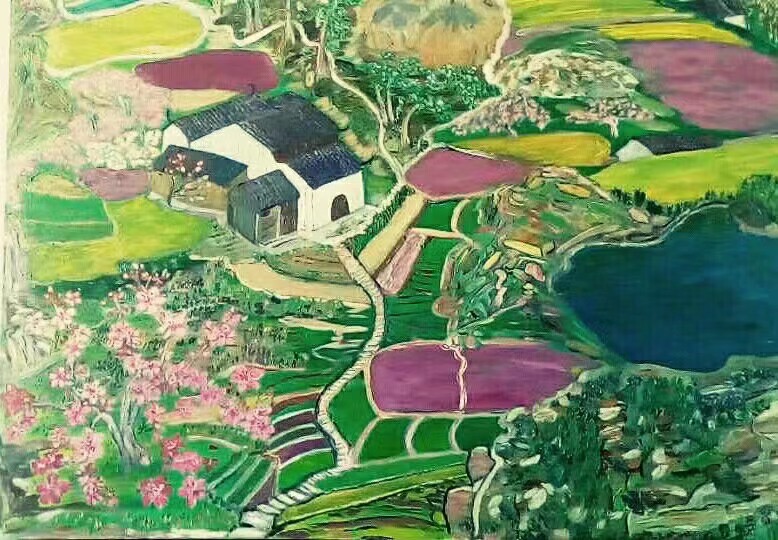
Wang Liuyun's works. /Courtesy of Wang Liuyun
Wang Liuyun's works. /Courtesy of Wang Liuyun
In the spring of 2018, she arrived in Shenzhen, looking to learn more technical virtuosity at Dafen Oil Painting Village, known as "the world's art factory" that once produced some 60 percent of the planet's oil paintings. Numerous workshops house all schools and styles of fine arts, from representational to abstract, from replicas of masterpieces by Van Gogh, Rembrandt and Dalí to self-created, offbeat mirages in pigments.
There, Wang was dismissed as a rube. "They took me as a laughing stock because I was an old woman from a peasant background." Being a rural woman over 50 posed an enormous obstacle for Wang to continue with her dream. No one would take her as an apprentice.
She had to hide to observe how those painters made their oils during the time she spared from several odd jobs. Fortunately, the owner of a small, declining gallery where she later rented a corner as a place to paint was willing to teach her. "He and his wife told me to start with studying and copying masterpieces. I made replicas of seven famous paintings in three months. The self-study process proved to be very important to me," she recalled. Wang displays a strong character featuring elements of self-flagellation and self-improvement, which she attributes to her father's prodding.
"Unlike most rural patriarchs who preferred boys to girls at the time, my father, who was illiterate, taught me how to think independently when I was little. He exhorted me to become a 'zhuangyuan' (the first scorer in China's ancient imperial civil-service examination)," she told us, adding that the words of her equally obstinate father have long been the force driving her forward in tough times, including in 2020. That year, she lost the jobs that sustained her, as the service sector abruptly collapsed at the start of the pandemic. She left Shenzhen and became a Beijing drifter at the age of 54.

Wang Liuyun working as a cleaner in an office building in Beijing. /Courtesy of Wang Liuyun
Wang Liuyun working as a cleaner in an office building in Beijing. /Courtesy of Wang Liuyun
She's since been working as a cleaner in an office building in Beijing. After a day of work, she retires to her six-square-meter rental nestled in a shabby tenement, painting obsessively. Prior to that, she lived in a windowless storage room inside the women's restroom on the office building's 15th floor. There she had a drawing board set up next to a narrow folding bed under which neatly lay her pigments, palettes and brushes. Occasionally she'd go to parks to paint or stroll around art studios.
During her first year in Beijing, she produced dozens of pieces, which went on sale from several hundred to a few thousand yuan and all the while earned increasing recognition from the art circle. "Beijing is such a diverse and inclusive city where I'm having my dream come true. I've sold all my paintings finished before last October." She said she'd never get tired of Beijing.
Wang rose to fame, partly due to her artworks but more because of her life as both a cleaner and a painter – a peculiar combination in the public eye. Journalists from both national and independent news outlets flocked to her, looking to report an eye-catching story of how a cleaning lady was also a successful artist. Within a short period of time, Wang hit the headlines as a "cleaner artist" and caused a sensation.
Once she was invited to a national TV program recording. She was joyful and wore a scarlet red dress, but was asked to change into her dull grey janitor uniform. During that recording, she looked sullen and detached.
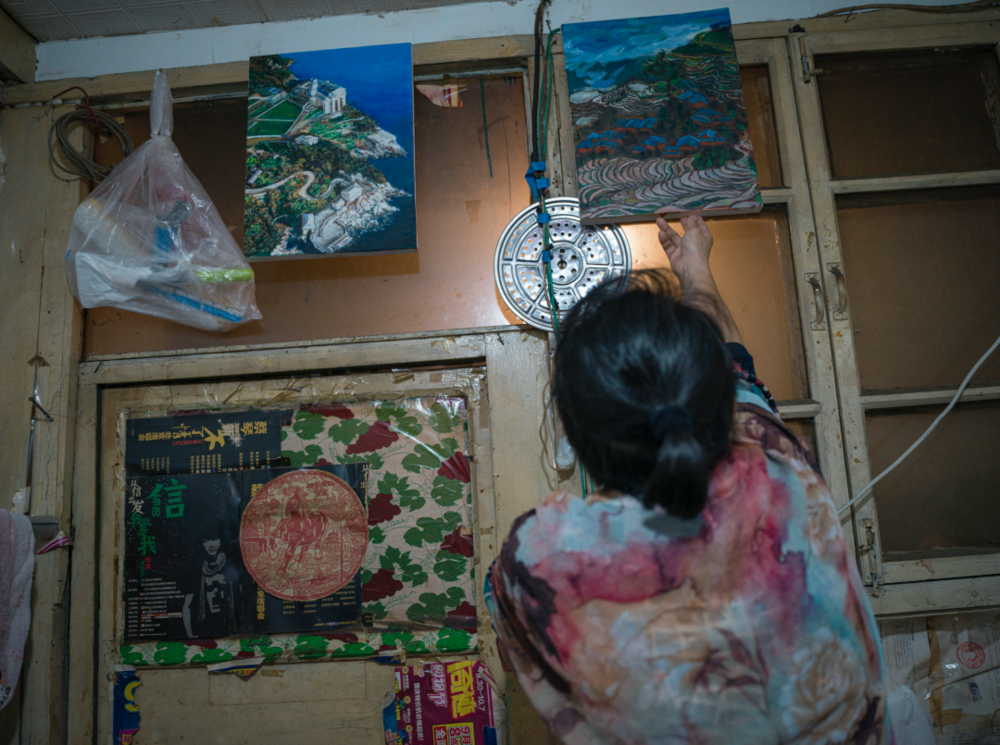
Wang Liuyun working on a painting at her rental in Beijing. /Courtesy of Wang Liuyun
Wang Liuyun working on a painting at her rental in Beijing. /Courtesy of Wang Liuyun
On most of the reports and programs exploring the duality of her identity, she remains noncommittal. But it looks as if she doesn't want to be pigeonholed.
Her oil paintings, mostly centered around typical rural dwellings, are scorned by some as provincial trinkets but celebrated by others as potential collectibles. To these reactions, she is more hit or miss, as she is with people. When we reached out to her for the first time for an interview in the fall of 2022, she changed her mind several times, partly due to COVID-19-related restrictions but also because of her "capricious" character, a word she used to describe herself to us when we finally sat down with her months later, after rescheduling over and again.
"I don't have much to say. You can embellish the story with whatever you want," she replied upon our interview request, though in person she's open, passionate and unguarded.

One of Wang Liuyun's works. /Courtesy of Wang Liuyun
One of Wang Liuyun's works. /Courtesy of Wang Liuyun
She shrugs off fame, money and the labels attached to her, as can be seen in her poems. She opened an account on social media platform Weibo over a year ago, and has since been writing poems and essays.
The image of moss flowers, also known as moss roses, that can survive on rocks only with minimum water, appears in a few of her poems.
"A summer rain lids a layer of fresh moss on the stone. Then a slope of moss flowers blossom out of the stone, though as silly as it is," she wrote in a recently published poem. "Moss flower, as tiny as a millet, is gorgeous, more dazzling than peony. Most people may have seen the moss but never had had a chance to see it blooming. I've seen the splendorous moss flower, which is a fortune that money can't buy," she gushed. She regards those who live for money as shallow.
Some of her writings are on a whim, while some others are based on real life stories she hears from others. "Sometimes people say they feel released when reading my poems, and that's what I write for – healing people," she said. Her first volumes of poetry were published in July.
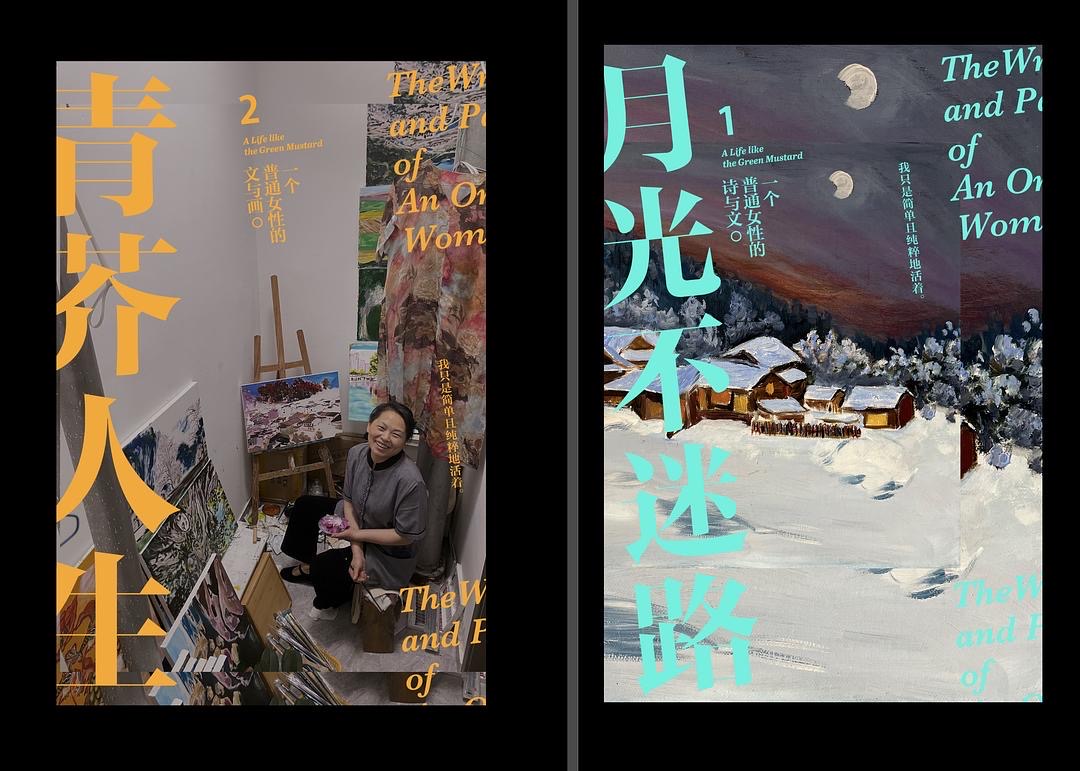
Two volumes of poetry by Wang Liuyun were published in July 2023. /Courtesy of Wang Liuyun
Two volumes of poetry by Wang Liuyun were published in July 2023. /Courtesy of Wang Liuyun
"Some say I have talent in art, but I attribute all of it to the strange yet charming stones in my hometown."
"I'm a lonely stone. Flying! Not yet seen the mountain."
Zhong Xia contributed reporting.